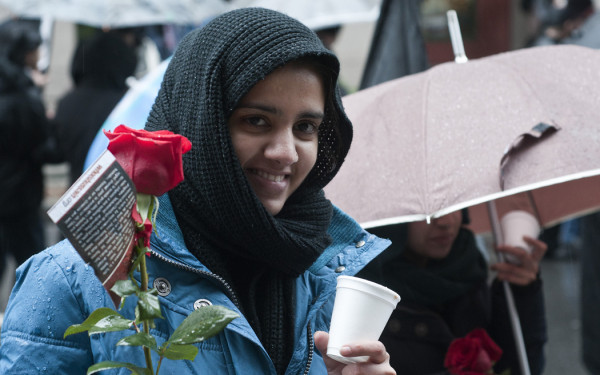Being Muslim and LGBT
Coming to Terms With the Intersection of Faith and Sexuality
“To me, those people are deranged. They’re ill, obviously. They’re not normal.”
I was fourteen when I heard those words from my mother. They were hushed—we rarely talked about homosexuality at home—but the disgust was evident in her tone. I wasn’t surprised. I didn’t agree, obviously, but I simply shrugged it off. I didn’t think that arguing with my religious mother about a topic we’d never agree on was worthwhile.
Then again, in those days, I was still convinced I was straight. I thought that the odd attraction I had towards one, or a few, of my female friends could be explained by us being closer than others. Or that it could simply be a stronger friendship. I thought my fantasies involving both boys and girls were something natural and common, and that it couldn’t possibly mean anything.
That is, until I casually mentioned it in a conversation with one of my Muslim friends. She stared at me in shock, her words disconcerted and incredulous. “That’s gay, you know. I don’t think about things like that,” she told me.
Her words made me stop short, reconsidering what I had just shared. Her words and harsh tone of voice actually hurt, hitting closer to home than I ever thought they could.
There’s an odd double standard that comes with being Muslim and LGBT. It’s more than just the Muslim community as a whole barely acknowledging its LGBT counterpart. It goes beyond that—it’s as if the Muslim community completely failed to recognize the possibility of Muslims not being straight. As if being queer and Muslim weren’t compatible and were mutually exclusive. Maybe it’s why it took me so long to realize I was bisexual.
I came to terms with my sexuality at sixteen, but it wasn’t easy. Although I soon realized that I had always felt an attraction for men and women, accepting this reality was difficult.
The biggest barrier was my Muslim faith. After being told time and time again by both family and friends that being anything but straight was wrong—disgusting, even—I started questioning whether my faith was still valid; whether it was really compatible with who I was.
The Quran’s address of homosexuality is rather vague, and disputed by many. Typically, the story of Lot is the one most often referenced to demonstrate Islam’s disapproval of homosexuality. Lot was a Prophet of God, sent to the towns of Sodom and Gomorrah to preach God’s Almighty power and dissuade them from their “sinning” ways.
“Indeed, you approach men with desire, instead of women. Rather, you are a transgressing people,” the Quran quotes (7:81). Faced with the disobedience of the people he was preaching to—as well as his own wife—the story also details that Lot was told by God to leave, and the cities were destroyed the next day, as it “rained upon them stones of layered hard clay,” (11:82).
Due to its direct mention of a man-on-man relationship, Lot’s story is widely interpreted as a direct and clear disapproval of homosexuality in Islam. That’s the case for my parents, anyways. Lot’s story is almost always mentioned when homosexuality is brought up during a discussion, as a reminder of its “impurity” and “immorality.”
It’s as if the Muslim community completely failed to recognize the possibility of Muslims not being straight.
However, some scholars have pointed out the lack of explicit condemnation of that type of relationship, paired with the practices of rape also mentioned in Lot’s story that might be misleading when interpreting the nature of those relationships. The ambiguous nature of that tale makes it difficult to assume anything about the real reason for the punishment of the people of Sodom and Gomorrah. Was it their alleged homosexual relationships, or their disbelief of God?
Personally, Lot’s story does very little to convince me of any sin related to homosexuality. My views as a Muslim might be seen as liberal to some, but I strongly believe that my faith and my actions towards it matter more than things like my sexual identity or orientation. My bisexuality doesn’t have to alter my faith in God, or my will to help others, to preach peace, to be a better Muslim. After all, my relationship with God concerns me and me alone, and no one else should have a say in that.
Of course, coming to that conclusion took time. At sixteen, I had no one to share my thoughts with. Friends with little to no knowledge of Islam simply couldn’t understand or relate to my point of view as a Muslim. Meanwhile, I had no one within my Muslim community who was willing to challenge their own ideas on LGBT issues, let alone accept me as a bisexual. I sorted it out on my own, in the end, but I still feel the need to speak up.
I might never be able to properly come out to my family due to their views. I might never be able to speak about these issues under my real name. But I can try my best to shine light on a reality that I believe is often overlooked: The reality of LGBT Muslim youth is stuck in a precarious equilibrium between faith and identity. By sharing my story, I hope we start considering the need to acknowledge those people; to give them a voice, to welcome them, and to listen to them.



ED1(WEB)_1_600_375_90_s_c1.jpg)
(WEB)_600_375_90_s_c1.jpg)

_600_375_90_s_c1.jpg)